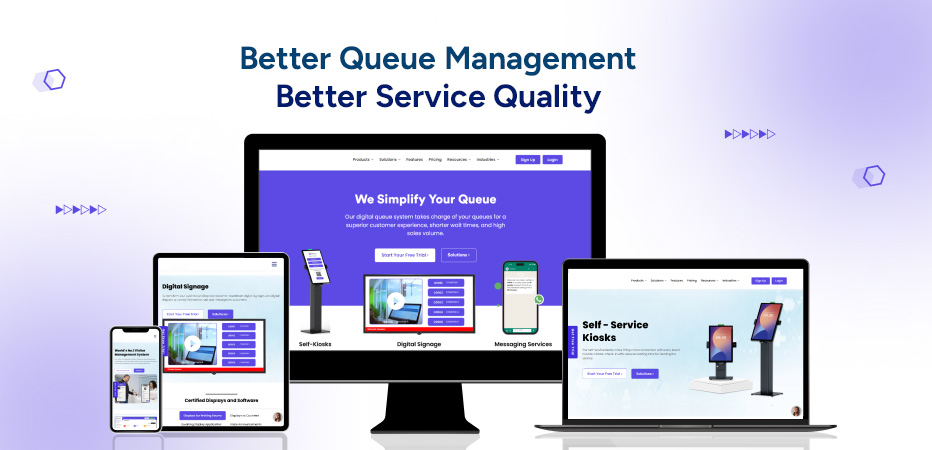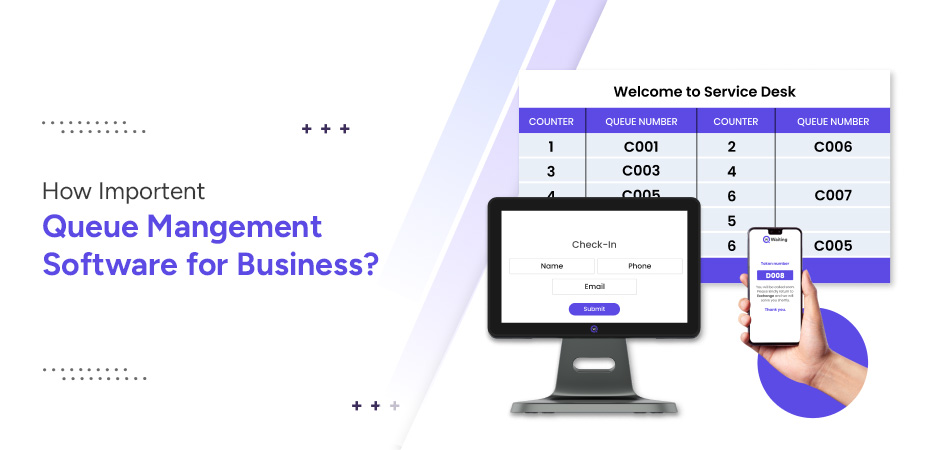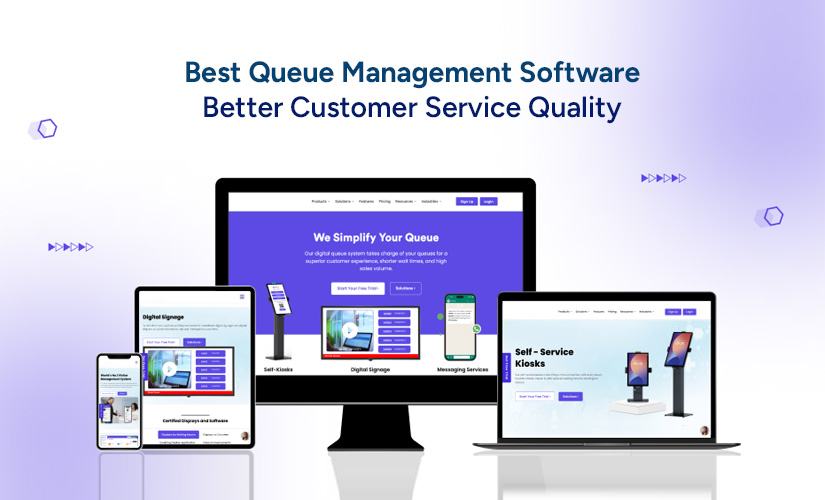What is Queue Management System Software?
One of the crucial tools helping organizations streamline operations and enhance the customer experience is Queue Management System (QMS) software. This comprehensive guide will delve into everything you need to know about QMS software, its benefits, features, and how to choose the right system for your business.
Queue Management System (QMS) software is a digital tool designed to organize and manage the flow of customers, employees, or visitors in a queue. It helps businesses in various sectors—such as retail, healthcare, banking, and public services—control and streamline waiting lines, reduce wait times, and improve the overall customer experience.
A QMS typically includes hardware components like kiosks, ticket printers, and display screens, as well as software that manages the queuing process, tracks customer data, and generates reports. By automating the queuing process, businesses can enhance efficiency and ensure a more pleasant experience for their customers.

Why is Queue Management System Software Important?
- Enhanced Customer Experience: Long wait times can lead to frustration and dissatisfaction. A QMS reduces perceived waiting times by providing clear information on queue status and expected waiting times.
- Operational Efficiency: Automated queue management helps optimize staff allocation and workflow. Employees can focus on providing better service instead of managing queues manually.
- Data Insights: QMS software provides valuable data on customer behavior, peak hours, and service efficiency. This data helps businesses make informed decisions and improve service quality.
- Compliance and Safety: In sectors like healthcare and public services, maintaining order and social distancing is crucial. A QMS ensures compliance with safety regulations by managing crowd flow and preventing overcrowding.
- Scalability: Queue management systems can be scaled and customized to meet the needs of small businesses as well as large enterprises, making them a versatile solution for various industries.
Key Features of Queue Management System Software
When choosing a QMS for your business, it’s essential to understand the key features that make up an effective system. Here are some of the most important features to look for:
1. Virtual Queuing
Virtual queuing allows customers to join a queue remotely via a mobile app, website, or SMS. This feature eliminates the need for physical waiting and enables customers to spend their waiting time more productively.
2. Appointment Scheduling
Integrating appointment scheduling with a QMS allows customers to book appointments in advance. This feature is particularly beneficial for industries like healthcare, banking, and government services, where appointments can help manage high customer volumes more efficiently.
3. Real-time Queue Monitoring
Real-time monitoring provides both customers and staff with up-to-date information on queue status. It enables managers to monitor service performance and make adjustments as needed.
4. Analytics and Reporting
Comprehensive reporting features provide insights into queue trends, average waiting times, and service efficiency. These analytics help businesses identify bottlenecks and make data-driven decisions to improve customer service.
5. Multi-location Support
For businesses with multiple locations, a centralized QMS that supports multi-location management is crucial. It allows for consistent service quality and streamlined operations across all branches.
6. Customizable Interface
A customizable user interface ensures that the QMS aligns with your brand and service requirements. Look for systems that allow you to customize display screens, notifications, and messaging to enhance the customer experience.
7. Multi-channel Notifications
Notifications can be sent via SMS, email, or in-app alerts to keep customers informed about their queue status and expected wait time. This feature helps reduce anxiety and enhances customer satisfaction.
Industries That Benefit from Queue Management System Software
Queue management systems are versatile and can be adapted to various industries. Here are some sectors that benefit the most from implementing a QMS:
1. Retail
In retail, a QMS can be used to manage queues at checkout counters, service desks, and fitting rooms. By providing a smooth shopping experience, retailers can increase customer satisfaction and sales.
2. Healthcare
Hospitals and clinics use QMS software to manage patient flow, reduce waiting times, and ensure that patients are attended to in a timely manner. This not only improves patient satisfaction but also enhances operational efficiency.
3. Banking and Finance
Banks often face high foot traffic, especially during peak hours. A QMS helps manage customer flow, reduces wait times, and ensures that customers are directed to the right service counters efficiently.
4. Government Services
Government offices use QMS software to manage queues for services such as license renewals, permits, and registrations. This helps reduce wait times and ensures a smoother service experience for citizens.
5. Telecommunications
Telecom service centers use QMS software to manage queues for bill payments, service inquiries, and technical support. A streamlined queuing process helps reduce customer wait times and improves service efficiency.

How to Choose the Right Queue Management System Software
Choosing the right QMS for your business depends on several factors. Here’s what you need to consider:
1. Business Requirements
Identify your specific business needs, such as the number of locations, peak hours, and customer demographics. Choose a system that offers the features that align with your business requirements.
2. Scalability
Ensure that the QMS can scale with your business. As your business grows, the system should be able to handle increased customer volumes and integrate with other business tools and platforms.
3. Ease of Use
The software should be user-friendly for both customers and staff. A complex system can lead to operational inefficiencies and poor customer experiences.
4. Integration Capabilities
Look for a QMS that integrates seamlessly with other business systems such as CRM, ERP, or appointment scheduling tools. This ensures a unified approach to customer management and service delivery.
5. Cost and ROI
Evaluate the cost of the software against the potential return on investment (ROI). Consider factors such as reduced wait times, improved customer satisfaction, and enhanced operational efficiency when calculating ROI.
6. Customer Support
Reliable customer support is crucial for the successful implementation and operation of a QMS. Choose a provider that offers comprehensive support and training for your staff.
Future Trends in Queue Management System Software
As technology continues to evolve, so does the functionality of QMS software. Here are some trends to watch out for in 2024 and beyond:
1. AI-Powered Queue Management
Artificial Intelligence (AI) is being integrated into QMS software to predict peak hours, optimize staff allocation, and personalize the customer experience. AI-powered systems can learn from historical data and make real-time adjustments to improve efficiency.
2. Omnichannel Integration
Future QMS software will offer seamless integration across multiple channels, including in-store kiosks, mobile apps, and online platforms. This allows businesses to manage customer flow holistically, regardless of where the interaction begins.
3. Enhanced Data Security
As data privacy becomes increasingly important, QMS providers are focusing on enhancing the security of customer data. Expect more robust data encryption and compliance with international data protection regulations.
4. Remote Queue Management
With the rise of remote work and virtual interactions, QMS software is evolving to include remote queue management features. Customers can join queues, make appointments, and access services without physically visiting a location.
Conclusion
Implementing a Queue Management System software is a smart investment for businesses looking to enhance customer experience, improve operational efficiency, and gain valuable insights into service performance. By choosing the right QMS for your business, you can streamline operations, reduce wait times, and ensure a seamless service experience for your customers.
Whether you’re in retail, healthcare, banking, or any other industry, a well-implemented QMS can transform the way you manage customer interactions and boost your business’s overall performance. As technology continues to advance, keeping an eye on the latest trends will ensure that your business remains at the forefront of customer service innovation.



